10/10
Gripping, emotive war film
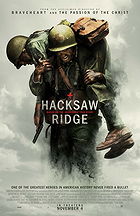 Posted : 8 years, 5 months ago on 10 November 2016 11:26
(A review of Hacksaw Ridge)
Posted : 8 years, 5 months ago on 10 November 2016 11:26
(A review of Hacksaw Ridge) 0 comments, Reply to this entry
0 comments, Reply to this entry
A glorious action fiesta - but not without issues
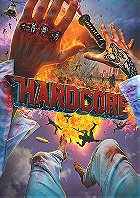 Posted : 8 years, 6 months ago on 31 October 2016 02:46
(A review of Hardcore Henry)
Posted : 8 years, 6 months ago on 31 October 2016 02:46
(A review of Hardcore Henry)The narrative thrust of 2016's Hardcore Henry is nothing out of the ordinary, but the "hook" is that it's a first-person action movie, shown entirely from the point of view of the titular cyborg. Russian filmmaker Ilya Naishuller makes his directorial debut here after making quite a splash online by testing the first-person technique in action-packed music videos which raised demand for a feature-length motion picture in the same vein. The result is fundamentally a 95-minute POV chase, with Naishuller staging as much first-person carnage as possible, from fisticuffs to shootouts to car chases. It should be an easy home run, but the experience is ultimately let down by an uninteresting story and too many tedious lulls between the action sequences.
Informed that he has been saved from certain death, Henry (played by several stuntmen) wakes up in mysterious high-tech facility with missing limbs and absolutely no memory of who he is. Coming into view is Estelle (Haley Bennett), who claims to be Henry's wife, and who finishes his rehabilitative operation by fitting him with robotic limbs. When the facility is attacked and Estelle is taken prisoner by telekinetic supervillain Akan (Danila Kozlovsky), Henry goes on the run, pursued by dozens of Akan's heavily armed soldiers who seek to capture the special individual. The only person willing to help Henry is the rather strange Jimmy (Sharlto Copley), who's capable of regenerating into countless different bodies and personalities, never remaining deceased for too long.
The big downfall of Hardcore Henry is the convoluted story, which puts a damper on the sense of fun throughout. It's often tricky to unravel the narrative, and more explanation would have been beneficial in the grand scheme of things. It's worth nothing that Henry cannot talk and his face is never properly seen, thus no actor actually portrays the character - instead, he was brought to life by a team of crazy stuntmen. (Writer-director Naishuller even plays Henry in some scenes.) Commendably, though, it's still possible to empathise with Henry and want to see him succeed in his mission. The big acting standout is Copley, who also executive produced the film. Copley assumes many different personas throughout (some more effective than others), allowing him to ham it up when the occasion calls for it, and he even performs a fun doppelgänger-filled musical performance of Frank Sinatra's "I've Got You Under My Skin." Meanwhile, Bennett does well as Estelle, and Kozlovsky (a Russian heartthrob superstar) makes for a sinister villain. Tim Roth even shows up in a minor role as Henry's father.
Produced for pocket change, Hardcore Henry was primary lensed using consumer-grade GoPro Hero 3 digital cameras, making for a rough-around-the-edges experience. With a team of eager stuntmen at his disposal, Naishuller orchestrates an over-the-top orgy of ultraviolence, pitting Henry against an endless supply of faceless goons who are beaten up, shot, and blown apart. Hardcore Henry is at its best during the fast-paced scenes of carnage, and Naishuller manages to vary the action sequences to sustain the picture's new car smell - on top of a standout sniper sequence and an insane car chase, there's even a set-piece involving a freaking tank, while helicopters and horses make appearances. Indeed, the movie is consistently creative in the action department, and Queen's "Don't Stop Me Now" is even used during the climax. Editing is often choppy and fast, with plenty of cuts as opposed to a more seamless experience, but this does not significantly detract from the consistently impressive action scenes.
Hardcore Henry is definitely a film for a certain niche. It's excessive and ridiculously violent, and there's nothing in the way of subtlety on display, but it does its job well enough and emerges as something unique in a very crowded contemporary blockbuster marketplace. In spite of its story issues, there are enough violent highlights to render the movie worth watching, especially for action junkies seeking a fix.
6.1/10
 0 comments, Reply to this entry
0 comments, Reply to this entry
Uplifting and emotionally powerful
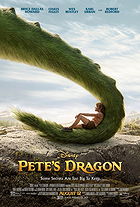 Posted : 8 years, 6 months ago on 31 October 2016 02:40
(A review of Pete's Dragon)
Posted : 8 years, 6 months ago on 31 October 2016 02:40
(A review of Pete's Dragon)2016's Pete's Dragon is a Disney movie through and through. It's a formulaic endeavour from a narrative perspective, and the characters are predominantly standard-order, including some antagonistic archetypes. In addition, it's a remake of a motion picture from 1977, and remakes are rarely necessary. But hell, I'll be damned if it doesn't work. Another step in Disney's grand plan to transform their animated catalogue into live-action movies (the original Pete's Dragon was only partially animated, mind you), this reimagining does away with all the singing, dancing and mugging in favour of a more dramatic, heartfelt feature. Pete's Dragon is simply enchanting; an incredibly poignant and engrossing family film with shades of E.T. that was clearly assembled by a passionate team of filmmakers who set out to do more than just cash in a paycheque.
Orphaned as a young boy after a car crash left him stranded deep in the wilderness, Pete (Oakes Fegley) is befriended by a furry, kind-hearted dragon who seeks to protect the boy. Naming the dragon Elliot, Pete manages to make a home for himself away from civilisation, but the forest becomes threatened by a logging company overseen by the steely Gavin (Karl Urban). While running around one day, Pete is discovered by friendly local forest ranger Grace (Bryce Dallas Howard), who seeks to take the young lad home to her daughter Natalie (Oona Laurence) and fiancée Jack (Wes Bentley). Pete is suddenly ripped away from his beloved friend, with nobody believing that Elliot actually exists, except for Grace's father Meacham (Robert Redford), who has long spoken about a brief encounter with big green dragon. As Pete bonds with Grace and her family, Gavin grows determined to capture Elliot for all the world to see.
Whereas any number of remakes are arguably unnecessary, Pete's Dragon is a premise ripe for reinterpretation, and it is in good hands under co-writer/director David Lowery, who has spent many years as a writer, director and editor of small-time indie features and shorts. It was a bold move on Disney's part to give Lowery a shot over a more experienced filmmaker, but the gamble pays off - the movie bursts with genuine passion, feeling like far more than just another paint-by-numbers visual effects blockbuster. It's a dramatic and meditative film, even opening with a heartbreaking sequence depicting the tragic car wreck that strands Pete in the wilderness where he meets Elliot. Even though it's a familiar story, Pete's Dragon works because it's an extremely competent version of an age-old tale of a boy and his wondrous companion.
Shot in idyllic New Zealand locations, the film looks magnificent, bolstered by Bojan Bazelli's eye-catching cinematography and Daniel Hart's touching original score. Fortunately, the adults are not portrayed as unfeeling or negligent, and the child characters aren't cloying, making this a rare family movie which respects its audience. Performances across the board are strong, with young Fegley in particular making a positive impression as Pete, sharing wonderful chemistry with Laurence. Howard is amiable as Grace, but Redford is even better, espousing endless charm and warmth. Urban's role is a bit too cliché, but the actor acquits himself well enough. As for Elliot, the dragon is brought to vivid life by way of marvellous digital effects, and it helps that the design of the creature is agreeably unique - you won't mistake Elliot for Smaug or one of the dragons from Game of Thrones.
With Pete's Dragon, The BFG and Kubo and the Two Strings, it seems that 2016 is the year of heartfelt family movies that nobody bothered to see. Whatever flaws exist in the screenplay are compensated for in the top-flight execution, and it's wonderful to see a Disney film that manages to be uplifting and emotionally powerful, devoid of cheap theatrics and computer-generated artifice.
8.2/10
 0 comments, Reply to this entry
0 comments, Reply to this entry
Old-fashioned cowboy flick
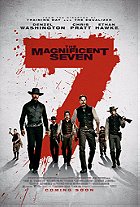 Posted : 8 years, 6 months ago on 16 October 2016 10:19
(A review of The Magnificent Seven)
Posted : 8 years, 6 months ago on 16 October 2016 10:19
(A review of The Magnificent Seven) 0 comments, Reply to this entry
0 comments, Reply to this entry
Powerful human drama
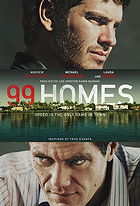 Posted : 8 years, 9 months ago on 30 July 2016 03:37
(A review of 99 Homes)
Posted : 8 years, 9 months ago on 30 July 2016 03:37
(A review of 99 Homes)In the same vein as writer-director Ramin Bahrani's previous motion pictures (Chop Shop, Man Push Cart), 99 Homes is a hard-hitting drama which comments on the difficulties of surviving in today's economically unstable world. More specifically, 99 Homes is about the events which took place during the recent housing crisis in the United States, when many helpless families were evicted from their residences. It's fertile territory, serving as something of a companion piece to the likes of 2011's Margin Call and Adam McKay's 2015 Oscar contender The Big Short. But while it's concerned with lofty subject matter, 99 Homes does not play out like a stuffy lecture - rather, it's a powerful human drama with things to say about contemporary capitalism, showing how good people can be swallowed up by greed.
A construction worker in Florida, Dennis Nash (Andrew Garfield) struggles to find stable work and cover his debts, trying his hardest to retain his family home where he lives with son Connor (Noah Lomax) and mother Lynn (Laura Dern). Despite Nash's best efforts, the bank forecloses on his home, and he faces the cold-blooded wrath of opportunistic real estate agent Rick Carver (Michael Shannon), who makes a lot of money from collecting properties. Heartbroken, Nash takes his family to live in a dingy motel to join others in similar circumstances, hoping to one day win back his former home. Desperate for work, Nash receives an unexpected job offer from Carver, who's in need of people to do manual labour on foreclosed homes. The deal is too good to pass up, with Nash earning stacks of money by evicting helpless families and exploiting the government system, but his conscience begins to trouble him as he's drawn deeper in Carver's dark empire built out of other people's misfortune.
What ensues is very reminiscent of Oliver Stone's Wall Street, with Nash being drawn into an immoral world for the sake of riches, questioning his integrity at every step. The key difference between the two films, however, is that Nash operates for survival, rather than pure greed. The brilliance of Bahrani's approach to the story is that he examines both sides of the coin, shining a light on the plight of the hardworking individuals struggling to keep a roof over their heads, as well as Carver, the numbed real estate agent who warns against the perils of debt. 99 Homes is most fascinating when it concentrates on Carver in action and shows his process, but the movie is less successful when it's about specific individuals. Bahrani keeps the movie afloat with his focused storytelling, but a climactic standoff is a bit much, and sometimes the script feels a bit too pat for a subject matter as utterly dense as this.
99 Homes may be 110 minutes, but it moves at an exceptionally brisk speed, thanks in no small part to the raw handheld cinematography, expert framing, and the pounding original soundtrack by Antony Partos and Matteo Zingales. The craftsmanship on display is simply superb, doing justice to this thematically dense drama. Of particular note is the truly bravura scene of Dennis and his family being evicted by Carver and his hired police officers, who are cold to their pleas of mercy. It's a heart-wrenching, riveting sequence which effectively conveys the shame, horror and emotion of an eviction, and it generates a real sense of loss as the powerless residents are forced to vacate their long-time home.
At the centre of this story is an exceptional cast, with Bahrani extracting focused performances from the entire ensemble. Coming off his limited run as Spider-Man, Garfield shows himself to be a talented thespian worthy of Oscar consideration, placing forth his most nuanced work to date as Nash. It's a tricky role to play, but Garfield does it justice, managing to keep us on his side despite what he's forced to do, showing that he has a conscience and simply wants to keep his family afloat. Powerful moments abound, including a number of heartbreaking scenes in which Nash is forced to evict helpless people but finds himself dangerously unconfident. But it's Shannon who walks away with the entire movie as the emotionless Rick Carver, who puts aside all sentimentality as he carries out his dire duty. Shannon is commanding and enthralling, but never showy, managing to carve out a villainous character that's not just one-note. Superb support is also provided by Dern, who plays very well alongside Garfield.
Smartly, Bahrani does not concern himself with the convoluted intricacies of the stock market or real estate loans, which would have more than likely murdered the strong pacing. 99 Homes instead concentrates on how the end result affects families while certain individuals continue to get rich, making for a fascinating examination of a world that we rarely get to see in motion pictures. Even though it does fall short of perfection, it's a timely and important fictional drama with real-life underpinnings, and it absolutely must be seen.
8.2/10
 0 comments, Reply to this entry
0 comments, Reply to this entry
Delivers the freaky goods with confidence
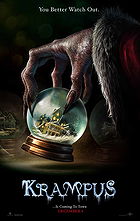 Posted : 8 years, 9 months ago on 19 July 2016 05:42
(A review of Krampus (2015))
Posted : 8 years, 9 months ago on 19 July 2016 05:42
(A review of Krampus (2015))Filmmaker Michael Dougherty made quite an impact with his anthology horror movie Trick 'r' Treat all the way back in 2007, but the writer-director seemingly disappeared after the release of that cult gem, despite showing tremendous genre talents. 2015's Krampus is Dougherty's long overdue follow-up endeavour, and it combines the dysfunctional family antics of National Lampoon's Christmas Vacation with the horror film sensibilities of Joe Dante's Gremlins and the Euro eccentricity of Rare Exports: A Christmas Tale. Comparisons to Gremlins are inevitable, as Dougherty establishes a distinct throwback vibe, relying on practical effects as much as possible, making smart use of the modest budget at his disposal. Krampus may be PG-13, but don't let the docile rating fool you - Dougherty delivers the freaky goods with reassuring confidence.
December 25 is approaching in suburbia, and pre-teen Max (Emjay Anthony) is finding it hard to maintain his Christmas spirit. His father Tom (Adam Scott) is a workaholic, while his mother Sarah (Toni Collette) is anal retentive as she prepares for the arrival of their extended family. Stomping into the house are Linda (Allison Tolman), her husband Howard (David Koechner), and their bratty kids, on top of the horrendously rude Aunt Dorothy (Conchata Ferrell). When Max's cousins find his good-hearted letter to Santa Claus and openly mock him for it, Max rips up the note in a moment of frustration and tosses it out into the snowy night. However, this act inadvertently summons Krampus, a demonic figure of Alpine folklore whom Max's immigrant grandmother Omi (Krista Stadler) is all too familiar with. As a colossal blizzard moves in, the family become trapped inside the house as they're gradually picked off by Krampus and his ghoulish minions.
Instantly announcing itself as the antithesis of standard Hollywood Christmas movies, Krampus opens with an inspired montage showing the madness that occurs when holiday shoppers rush into department stores on Black Friday. Unfolding entirely in slow motion, Dougherty focuses on the frantic customers who get into fights with one another and trample on the fallen, driven by rampant consumerism. It's a brilliantly provocative opening scene, even playing out to the tune of Andy Williams' "It's the Most Wonderful Time of the Year," and it underscores that Christmas cheer is perhaps not quite what it used to be once upon a time. If there's a flaw with Dougherty's storytelling, it's that the movie does drag during its opening act, with the material involving the extended family never quite gaining much comedic traction. And when Krampus does come out to play, the moments of respite are overly hit and miss, with uneven pacing.
In its second half, Krampus transitions into a home invasion tale, and the ensuing attack scenes are consistently thrilling, establishing a Gremlins-esque tone of comedic mayhem. There's an underlying streak of dark humour which saves the flick from abject bleakness, and - much like with Trick 'r' Treat - Dougherty exhibits firm command of the screen, aided to no small degree by cinematographer Jules O'Loughlin. Krampus embraces practical effects as well, giving vivid life to the hair-raising creatures through elaborate costumes and puppetry, affording an '80s horror flick feel and adding a sense of tangibility to the nightmare. The digital gingerbread men aren't quite convincing, and do look slightly out of place, but the rest of the titular demon's minions are thankfully more tactile. And just to reinforce the throwback feel, there's a flashback sequence told using Rankin and Bass-style stop-motion animation in which Omi reveals her childhood experience with Krampus in Germany. It's a nice touch indeed. Krampus is more unnerving than outright terrifying, but it's a skilful ride all the same.
Performances are suitably convincing right down the line, especially with the likes of Scott and Collette who are watchable in anything, while Koechner makes a positive impression playing a redneck stereotype. The chaos eventually culminates for a shrewd ending that rejects many of the more obvious story resolutions, and even leaves things open for interpretation. Not everything works in Krampus, but it does breathe fresh cinematic life into a creepy Christmas legend. It might become a new annual film-watching tradition at Christmas for the same folks who enjoy the more unorthodox holiday movies like Bad Santa and Die Hard.
7.3/10
 0 comments, Reply to this entry
0 comments, Reply to this entry
Involving gambling drama
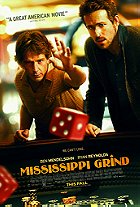 Posted : 8 years, 9 months ago on 16 July 2016 02:51
(A review of Mississippi Grind)
Posted : 8 years, 9 months ago on 16 July 2016 02:51
(A review of Mississippi Grind)The latest feature to be written and directed by the filmmaking team of Anna Boden and Ryan Fleck (Half Nelson), 2015's Mississippi Grind is old-fashioned all the way through to its core, evoking motion pictures from the '60s and '70s with its unhurried pacing and beautifully filmic cinematography. Taking notable inspiration from the likes of Five Easy Pieces and 1974's The Gambler, this is a motion picture about gambling, but it's not concerned with the usual glamour associated with Las Vegas or Atlantic City. Instead, Mississippi Grind is more dramatic, providing an unusually solemn, incisive examination of a potentially destructive hobby. The film's appeal is not derived from casino action, but rather from the interplay of the two fascinating central characters.
In Iowa, self-destructive gambling addict Gerry (Ben Mendelsohn) is stuck in a serious rut. Due to his addiction, Gerry has lost his wife and child, while a loan shark also threatens violence if he doesn't pay his debts. By chance, he meets fast-talking drifter Curtis (Ryan Reynolds) during a game of poker, and the two strangers find themselves drawn together by their shared hunger for gambling in all its forms. Becoming fast friends, Gerry and Curtis look to score big, deciding on an impromptu trip down to New Orleans for a high-stakes poker tournament. Hitting the road, the pair bond as they gamble at every turn, but Curtis gradually begins to understand the depths of Gerry's personal problems.
Mississippi Grind delves into the serious ramifications of a gambling addiction, serving as an effective character study of Gerry, who continually yearns for the thrill of watching a dog race or rolling a dice, counting down the seconds until he gets to leave his menial job and return to a casino. In the very first scene of the movie, Gerry is seen listening to a CD about observations on human behaviour, educating himself on how to tell if a person is bluffing at the poker table. Mississippi Grind is episodic in its road trip structure, but there's a proper narrative through-line and all the vignettes come together in a cohesive fashion. If there's an issue from a storytelling perspective, it's that the ending doesn't quite mesh with the rest of the movie, as the script begins to veer more into wish-fulfilment territory, clashing with the otherwise realistic tone.
The decision to shoot on 35mm film stock enhances both the sense of atmosphere and the old-fashioned vibe, and it makes the movie look more expensive than a digital production. The non-flashy cinematography (by Andrij Parekh) is effectively vérité at times, too, especially when Gerry and Curtis hit the liquor, and the visuals are supplemented by a pleasant soundtrack of rhythm and blues tunes. But it's the strong performances and astute characterisations that keep Mississippi Grind compulsively watchable from start to end. Accomplished character actor Mendelsohn is note-perfect as Gerry, masking his natural Australian accent to espouse a wholly convincing American drawl that feels entirely lived-in. Alongside him, Reynolds (in a role meant for Jake Gyllenhaal) is enormously charismatic and energetic, displaying his strong dramatic chops that we rarely get to see. He's nicely subdued as well, never coming across as showy, and even though this isn't a comedy, there are some moments of tender humour which make Curtis seem more innately human. Mendelsohn and Reynolds are so great together, registering plenty of bromantic chemistry. Appealing support is also provided by Sienna Miller as Simone, a caring prostitute who touches Curtis' heart, while Analeigh Tipton shares a few sweet moments opposite Mendelsohn as Simone's friend Vanessa. There are a lot of really nice scenes peppered throughout the movie, especially when the two boys find themselves in the company of their female companions.
Mississippi Grind doesn't snowball into anything revolutionary and it's hard to walk away truly loving it, but it's nevertheless a competent motion picture bolstered by strong performances and focused filmmaking, and that's good enough to warrant a recommendation. The pacing is leisurely, and it does require patience, but there are plenty of pleasures to extract from this involving drama if you choose to give it a shot.
7.3/10
 0 comments, Reply to this entry
0 comments, Reply to this entry
Sweet and candid rom-com
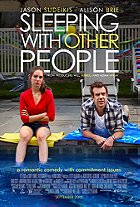 Posted : 8 years, 9 months ago on 14 July 2016 01:30
(A review of Sleeping with Other People)
Posted : 8 years, 9 months ago on 14 July 2016 01:30
(A review of Sleeping with Other People)Sleeping with Other People is a contemporary version of the When Harry Met Sally premise, as it explores similar themes and ideas to the landmark 1989 romantic comedy, but is far raunchier and edgier. It's probably the best of its kind since 2011's Friends with Benefits, and it helps that the central characters do seem like real human beings with shortcomings and feelings. Laughs may be spotty, but the actors remain on point all the way through, and pacing is constantly agreeable. It's never a chore to sit through.
Randomly meeting in college, Lainey (Alison Brie) and Jake (Jason Sudeikis) bond as they talk about sex, and wind up losing their virginities to one another, but they fail to stay in touch after their sexual encounter. Over a decade later, Jake has developed into a sex addict and a serial cheater, unable to find a woman with whom he wants to have a proper relationship. Lainey, meanwhile, is obsessed with college buddy Matthew (Adam Scott), an engaged doctor who sleeps with her but has no interest in a relationship. Running into each other at a support group meeting for love addicts, Lainey and Jake reconnect and immediately hit it off, but mutually agree to remain platonic friends since both of them have sabotaged every romantic relationship they've ever been in. It's a well-intentioned prospect at the outset, with the two happily spending time together and discussing each others' love interests and sexual trysts, but they begin to develop an undeniable bond.
Headland does borrow liberally from When Harry Met Sally, right down to lines like "men and women can't be friends," and even observing Lainey and Jake texting each other in bed, an apparent update of the phone conversations shared by the two leads in Rob Reiner's rom-com. But Headland goes a step further, rooting the central story in the serious issue of love and sex addiction, which gives the story a fresh perspective. Naturally, Sleeping with Other People is not as smart or as incisive as When Harry Met Sally, but Headland's script does manage to provide some amusing observations about relationships, sex and love. The big problem, though, is that although it does try to avoid many of the hoariest chestnuts of the rom-com genre, the story's outcome and many of the primary plot points are predictable. And since Headland does strive for candidness, this does seem to clash with her intentions.
Even though the narrative is very middle-of-the-road, Sleeping with Other People does provide a few moments of definite inspiration and comedic brilliance. One notable non-sequitur sees Jake and Lainey dropping ecstasy at a kids' birthday party and dancing with children to the tune of David Bowie's "Modern Love." And in another scene clearly inspired by Meg Ryan's restaurant orgasm, Jake teaches Lainey how to effectively masturbate, demonstrating on a juice bottle. For the most part, though, Headland relies on mild wit as opposed to juvenile antics in order to score laughs, keeping at least one foot planted in reality. Indeed, even in spite of the R rating, it doesn't feel like a mean-spirited Judd Apatow or Seth Rogen flick.
Although not as conventionally attractive as the likes of Zac Efron or Justin Timberlake, Sudeikis is a wonderfully endearing comedic lead, and he's versatile to boot, delivering vicious sarcasm and blasé snark whilst always coming across as warm and genial. And when the script calls for drama, Sudeikis handles it with assurance. Best of all, however, he shares wonderful chemistry with Brie, who's adorably perfect as Lainey. She's disarming whenever she's on-screen, and she manages to make her character seem genuine. It's so delightful to watch Brie and Sudeikis share the screen that the movie comparatively drags whenever they're apart. These two seriously need to take more roles like this. In the supporting cast, Jason Mantzoukas makes a positive impression as Jake's best friend Xander, while Adam Scott is fairly muted (by design) in a minor role as Lainey's object of infatuation.
It doesn't touch the dizzying heights of When Harry Met Sally (what movie can?), but Sleeping with Other People is a pleasant enough rom-com distraction, even if it is wholly predictable at the end of the day. Besides, it does have a heart-warming message in that some people do find others who "get" them, and those are the ones to embrace in whatever capacity that works. Sweet and often candid, Sleeping with Other People is one of the more enjoyable entries in this genre for some time.
6.2/10
 0 comments, Reply to this entry
0 comments, Reply to this entry
Disjointed, but has its moments
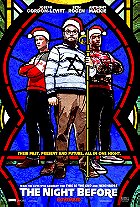 Posted : 8 years, 9 months ago on 10 July 2016 06:48
(A review of The Night Before)
Posted : 8 years, 9 months ago on 10 July 2016 06:48
(A review of The Night Before)Adult Christmas movies are few and far between, as the majority of Hollywood's festive output is aimed at the younger demographic. With the controversy of 2014's The Interview now in the past, filmmaking duo Seth Rogen and Evan Goldberg turn their attention to the holiday season for The Night Before, collaborating with 50/50 director Jonathan Levine for a rowdy, R-rated stoner comedy that also finds time for meaning and drama. Although amusing at times, it falls short of its potential, with the monkey business too often interrupted by half-hearted attempts at sincerity that lack genuine impact. It's certainly a far cry from the unorthodox brilliance of Bad Santa, though it's not entirely without merit.
As a young man, Ethan (Joseph Gordon-Levitt) lost his parents in a tragic car accident, leaving him without a family on Christmas. However, friends Isaac (Seth Rogen) and Chris (Anthony Mackie) come to the rescue, establishing a new tradition to come together every Christmas Eve to party. But with the trio all now in their thirties and ready to get serious about family and career, they decide that this year's night of drunken debauchery will be their last. Hoping to go out on a high note, Ethan manages to steal tickets to the biggest, most exclusive party in New York City: the elusive Nutcracker Ball. But not everything is working in the trio's favour, especially with Isaac consuming far too many drugs from a gift box that was given to him by his pregnant wife Betsy (Jillian Bell), while Ethan pines for beloved ex-girlfriend Diana (Lizzy Caplan).
It's a standard set-up that suggests a simplistic string of comic set-pieces, but Levine and co-writers Goldberg, Kyle Hunter and Ariel Shaffir search for meaning in each of the three leads, creating emotional arcs amid all the drugs and booze. On top of Ethan's depression relating to the loss of his parents and the break-up with Diana, Isaac freaks out over the notion of being a parent, and Chris starts using steroids to improve his NFL performance. It's laudable that The Night Before has ambitions beyond straight-up partying, but Levine has trouble negotiating the tricky tonal changes for this dramedy, and it feels laboured as a result when it should be breezy. Worse, a number of the jokes are on the pedestrian side, with Rogen simply overacting as usual while the script mostly relies on improvisation to get laughs. Unfortunately, it's hard to recall any particularly witty quotes, and it should be a lot funnier.
However, The Night Before is not a complete travesty. Some scenes and moments do work, while cinematographer Brandon Trost (The Interview) beautifully sets the Christmas mood with proficient lighting techniques and framing, dovetailed by an array of recognisable festive songs. The movie even opens with an amusing rhyme to make the story seem more like an old-fashioned Christmas tale, energetically delivered by none other than Tracy Morgan who serves as the movie's narrator. But the ace in the hole here is Michael Shannon (Man of Steel) as a zen-like drug dealer whose special brand of weed opens up portals to the past and future. Shannon is able to effortlessly achieve laughs by being so subdued in comparison to the rest of the cast, and you're ultimately left wishing that he had a bigger role. Meanwhile, Gordon-Levitt and Mackie are appealing, Bell gets a few moments to shine, and Caplan is disarming as always.
The Night Before simply cannot figure out if it wants to be a sweet dramedy like the excellent 50/50, or a straight-up stoner comedy like This is the End or Pineapple Express. It's disjointed as a result, but it does provide some fun throughout its 100-minute runtime, especially when the action shifts to the Nutcracker Ball where some famous faces show up (including Miley Cyrus, who runs with the opportunity to play a comically unhinged version of herself). It may not become a widespread new annual Christmas-watching tradition, but The Night Before certainly shouldn't wind up being listed as one of the worst Yuletide movies in existence.
6.3/10
 0 comments, Reply to this entry
0 comments, Reply to this entry
Chilling, but cannot come together properly
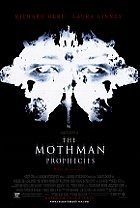 Posted : 8 years, 10 months ago on 9 July 2016 10:30
(A review of The Mothman Prophecies )
Posted : 8 years, 10 months ago on 9 July 2016 10:30
(A review of The Mothman Prophecies )The Mothman Prophecies more or less plays out like a feature-length episode of The X-Files, as it's concerned with an urban legend that's based in reality. Adapted from the 1975 book of the same name by John Keel, this supernatural thriller was directed by Mark Pellington, late of 1999's Arlington Road. The Mothman Prophecies is old-fashioned all the way through to its core, relying more on atmosphere and subtle chills than violence, and it does work to a certain extent. However, since the film was inspired by an unsolved supernatural case, it brings up far more questions than it can answer, and it both meanders and confuses due to the ostensibly random nature of many of its narrative threads. While there is intrigue here, the movie cannot quite come together well enough as a cohesive whole.
Even though the story purports to be based on true events that occurred in the late 1960s, the setting is updated to present-day, and follows (fictitious) Washington Post journalist John Klein (Richard Gere). John loses his beloved wife Mary (Debra Messing) to a brain tumor which is discovered after a sudden car accident, and John finds that his wife has been drawing a moth-like creature that she claims she saw on the night of the accident. Two years after Mary's death, John intends to drive down to Richmond one night, but inexplicably winds up in the sleepy town of Point Pleasant, having somehow travelled 400 miles in under two hours with no memory of what happened. Meeting local cop Connie Parker (Laura Linney), John is drawn into the town, where citizens are reporting strange happenings as well as sightings of a tall "mothman" creature that's very similar to Mary's drawings.
It would be best to approach The Mothman Prophecies as a piece of fiction that's loosely based on true events, as the script by Richard Hatem is a largely fabricated construction that weaves in a few factual events and as many creepy set-pieces as possible. (Whether by design or not, a number of "facts" stated by the movie are actually inaccurate.) However, the screenplay refuses to properly connect many of the plot points, and as a result, the film feels all over the place. It seems that it uses the unsolved nature of Mothman as an excuse to avoid answering everything, throwing out random horror conventions with mixed effectiveness. There are serious pacing issues as a result of the movie's haphazard structure, though it does improve to a degree with repeat viewings.
To Pellington's credit, he generates an unnerving atmosphere throughout the picture, especially with the competent cinematography and his expert use of shadows and sounds, amplified by a terrific soundtrack by tomandandy. The titular Mothman is only really glimpsed subliminally, and the bitterly cold setting helps to build a sense of gloom. The Mothman Prophecies is more of a mood piece than a scare-fest, rendering it a fascinating instance of restrained horror filmmaking. The movie's centrepiece is a stunning disaster climax which recreates the real-life collapse of the Silver Bridge, an event that supposedly brought an end to the strange occurrences in Point Pleasant. It does seem out of place since the rest of the proceedings are so low-key in comparison, but it does well to pull the rug out from underneath us, and it helps that the sequence is so gut-wrenching and riveting, not to mention competent from a technical perspective. A fair chunk of the $32 million budget likely went towards the climax, and the result is wholly worthwhile.
Even though Gere is a veteran performer who looks suitably focused here, his John Klein is too much of a blank slate, which is a problem. One cannot help but wonder how much more engaging the film might have been if it was more like The X-Files from a character perspective, and starred endearing actors like David Duchovny or Gillian Anderson who could have injected the story with some humanity. Ultimately, The Mothman Prophecies does have enough merit to make it worth watching, and Pellington's command of the screen is remarkable, but the material fails to properly serve the filmmaker.
6.2/10
 0 comments, Reply to this entry
0 comments, Reply to this entry
 Login
Login
 Home
Home 183 Lists
183 Lists 1664 Reviews
1664 Reviews Collections
Collections






















